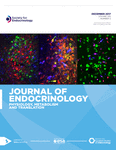Iodide transport and breast cancer
- School of Clinical and Experimental Medicine, Institute of Biomedical Research, University of Birmingham, Birmingham B15 2TT, UK
- Correspondence should be addressed to C J McCabe; Email: mccabcjz{at}bham.ac.uk
Abstract
Breast cancer is the second most common cancer worldwide and the leading cause of cancer death in women, with incidence rates that continue to rise. The heterogeneity of the disease makes breast cancer exceptionally difficult to treat, particularly for those patients with triple-negative disease. To address the therapeutic complexity of these tumours, new strategies for diagnosis and treatment are urgently required. The ability of lactating and malignant breast cells to uptake and transport iodide has led to the hypothesis that radioiodide therapy could be a potentially viable treatment for many breast cancer patients. Understanding how iodide is transported, and the factors regulating the expression and function of the proteins responsible for iodide transport, is critical for translating this hypothesis into reality. This review covers the three known iodide transporters – the sodium iodide symporter, pendrin and the sodium-coupled monocarboxylate transporter – and their role in iodide transport in breast cells, along with efforts to manipulate them to increase the potential for radioiodide therapy as a treatment for breast cancer.
- breast cancer
- iodide transport
- radioiodide
- sodium iodide symporter (NIS)
- pendrin
- sodium-coupled monocarboxylate transporter (SMCT)
- Received in final form 29 May 2015
- Accepted 28 July 2015
- Made available online as an Accepted Preprint 18 August 2015
- © 2015 Society for Endocrinology











